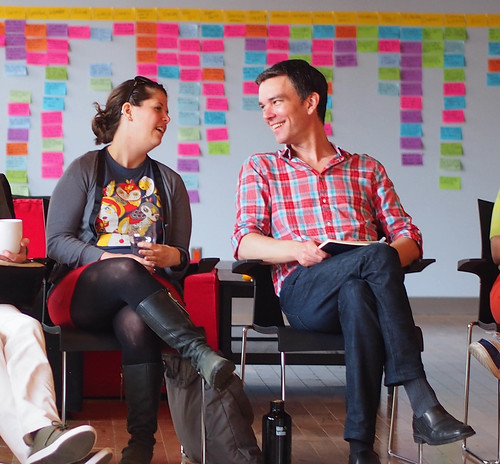People often wonder what working in the open is all about. Mozilla’s Matt Thompson wrote a great post that describes one of the goals of working open as “surfacing what’s needed to enable smart co-building.” If we don’t, he suggested, “not only will our communities have no idea how to get involved — our immediate peers and colleagues won’t be able to help as effectively, either.”

Working open at Mozilla.
Recently, a webmaker.org user inadvertently set off a feedback chain that illustrates exactly what working open can accomplish, and how everyday people can influence the products they use.
Techsavteacher is a techie and a teacher who blogs about her work. After experiencing some frustrating problems with Popcorn Maker, she posted a blog titled Getting Comfortable with Failure, describing how Popcorn had repeatedly crashed while she was using it.
Webmaker monitors Twitter and Facebook every day for user questions and feedback, so when we noticed her post on social media, Javascript developer Scott Downe hopped onto Twitter to troubleshoot the issue with Techsavteacher. When he pinpointed the problem, systems engineer Chris DeCairos created a bug in Bugzilla (that’s Mozilla-speak for a request to fix a problem) and front end engineer Matt Schranz started investigating the problem. Within hours, Matt had resolved the issue but the team collectively felt that wasn’t enough. Techsavteacher’s frustration had hit a nerve and David Humphrey, the lead developer at Webmaker, decided to respond on her blog. Here’s part of what he had to say: Thanks for posting about your experience using Popcorn Maker, and the frustration you encountered. I’m really sorry that things went so poorly for you, and wanted to reach out to let you know that your pain wasn’t in vain. I’m the developer lead for Mozilla’s Webmaker project, and reading a post like this one is both humbling and helpful. As a result of your post, tweet, and the project you created, a few of my devs were able to diagnose and fix the problem (the details are here https://bugzilla.mozilla.org/show_bug.cgi?id=917409). You hit an issue we haven’t seen before, and while you weren’t trying to help us work on the quality of these tools, that’s exactly what you’ve ended-up doing. […]I really appreciate the title of your post, because that’s such an apt description of what’s necessary for one to be a maker on the web. I know that my work building web technologies with Mozilla often leaves me feeling frustrated and like a failure many days, too. Part of what makes it better is having a community of people who can help us find and fix our bugs.
This is a big part of what working in the open is all about. Users can directly tell us, “Hey, your stuff is broken!” and not only can we take action and fix it, the process is public for anyone to see. It’s worth noting that this approach is unusual in the tech world; many companies are highly secretive about the development of their products and don’t provide opportunities for users to get involved. At Mozilla, we’re proud to work open, and we’re grateful to the users like Techsavteacher for helping us improve webmaker.org.
In addition, we adhere to the “release early, release often” philosophy, which allows the public get their hands on our work before it’s perfected. While this means users will occasionally uncover some frustrating glitches, it also gives them the chance to weigh in and help shape the tools they use. Working in the open allows users to be co-builders, which is one of the greatest strengths of the Webmaker project.
Mozilla is constantly striving to redefine what working in the open is all about. We’re building a FAQ to recognize the successes and address some of the challenges of this style of working. We welcome your contributions.
Get involved
- Read Matt’s blog How To Work Open.
- Read Techsavteacher’s blog Getting Comfortable with Failure.
- Learn more about using Bugzilla to contribute to Webmaker.
- Check out our FAQ on how to work open at Mozilla.
- Read Matt’s latest blog on what it means to work open at Mozilla.